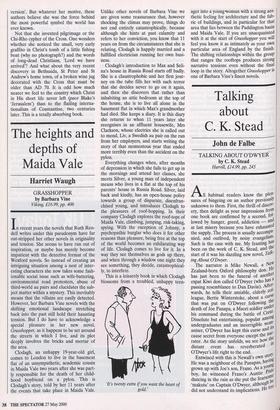The heights and depths of Maida Vale
Harriet Waugh
GRASSHOPPER by Barbara Vine Viking, £16.99, pp. 406
In recent years the novels that Ruth Ren- dell writes under this pseudonym have far out-stripped her other novels in originality and tension. She seems to have run out of inspiration, or maybe has merely become impatient with the detective format of the Wexford novels. So instead of creating an intriguing situation among a nest of inter- esting characters she now takes some fash- ionable social issue such as wife-battering, environmental road protesters, abuse of third-world au pairs and elucidates the sub- ject matter within a mystery. This inevitably means that the villains are easily detected. However, her Barbara Vine novels with the shifting emotional landscape stretching back into the past still hold their haunting tension. But I do have to acknowledge a special pleasure in her new novel, Grasshopper, as it happens to be set around the streets in which I live, and its plot deeply involves the bricks and mortar of the area.
Clodagh, an unhappy 19-year-old girl, comes to London to live in the basement flat of an unsympathetic, academic cousin in Maida Vale two years after she was part- ly responsible for the death of her child- hood boyfriend on a pylon. This is Clodagh's story, told by her 11 years after the events that take place in Maida Vale. Unlike other novels of Barbara Vine we are given some reassurance that, however shocking the climax may prove, things do not end entirely catastrophically, because although she hints at past calamity and refers to her conviction, you know that 11 years on from the circumstances that she is relating, Clodagh is happily married and a fulfilled electrician running her own busi- ness.
Clodagh's introduction to Max and Seli- na's house in Russia Road starts off badly. She is a claustrophobic and her first jour- ney on the tube fills her with such terror that she decides never to go on it again, and then she discovers that rather than inhabiting an attic bedroom at the top of the house, she is to live all alone in the basement flat in which Max's grandmother had died. She keeps a diary. It is this diary she returns to when 11 years later she recognises in an affluent housewife, Mrs Clarkson, whose electrics she is called out to mend, Liv, a Swedish au pair on the run from her employers, and starts writing the story of that momentous year that ended more terribly even than the accident on the pylon.
Everything changes when, after months of depression in which she fails to get up in the mornings and attend her classes, she meets Silver, a young man of independent means who lives in a flat at the top of his parents' house in Russia Road. Silver, laid back and kindly, has an open-house policy towards a group of disparate, disenfran- chised young, and introduces Clodagh to the pleasures of roof-hopping. In their company Clodagh explores the roof-tops of Maida Vale, climbing, jumping, risk-taking, spying. With the exception of Johnny, a psychopathic burglar who does it for other reasons than pleasure, being free at the top of the world becomes an exhilarating way of life. Clodagh comes to live for it. In a way they see themselves as gods up there, and when through a window one night they see something, they decide, catastrophical- ly, to interfere.
This is a leisurely book in which Clodagh blossoms from a troubled, unhappy teen- It's twenty extra i fyou want the heart of gold.' ager into a young woman with a strong aes- thetic feeling for architecture and the fab- ric of buildings, and in particular for that area that lies between the Paddington basin and Maida Vale. If you are unacquainted with it at the start of Grasshopper you will feel you know it as intimately as your own particular area of England by the finish. The shifting relationships within the group that ranges the rooftops produces strong narrative tensions even without the final loop in the story. Altogether Grasshopper is one of Barbara Vine's finest novels.


































































 Previous page
Previous page